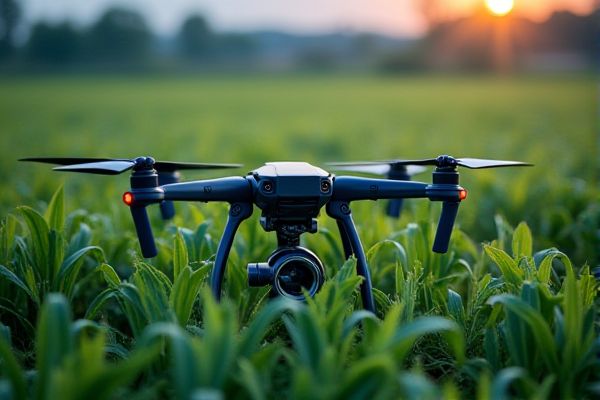
AI applications in agricultural technology enhance crop management through predictive analytics, enabling farmers to assess environmental conditions and optimize planting schedules. Precision farming techniques utilize AI for soil analysis, leading to more efficient use of resources such as water and fertilizers. Drone technology equipped with AI provides real-time monitoring of crop health, allowing for timely interventions to address pest infestations or diseases. Machine learning algorithms analyze historical yield data, supporting data-driven decisions that improve overall farm productivity and sustainability.
AI usage in agriculture technology
Precision Farming Techniques
AI usage in agriculture technology enhances precision farming techniques by enabling data analysis and decision-making. Using machine learning algorithms, farmers can predict crop yields more accurately, thus optimizing resource allocation. For instance, integrating sensors and AI software can help detect plant diseases early, allowing for timely intervention. This potential advantage can lead to increased efficiency and sustainability in agricultural practices.
Crop Health Monitoring
AI in agriculture technology can significantly enhance crop health monitoring by analyzing data from sensors and drones. This technology can detect early signs of disease or pest infestations, improving yield potential. For example, integrating AI with precision farming tools allows farmers to optimize resource use and minimize costs. The possibility of utilizing AI for real-time data analysis can lead to more informed decision-making and increased profitability in agricultural practices.
Automated Irrigation Systems
Automated Irrigation Systems can enhance water efficiency and crop productivity in agriculture. By utilizing AI, these systems can analyze soil moisture levels and weather forecasts to optimize watering schedules. Farmers using these technologies may see reduced water usage and improved crop yields, such as in the case of Smart Irrigation technologies. The potential for increased sustainability and cost savings exists as these systems become more widely adopted.
Yield Prediction Models
AI-driven yield prediction models can enhance agricultural efficiency by analyzing historical data and weather patterns. These models utilize machine learning algorithms to forecast crop yields, enabling farmers to make informed decisions about planting and resource allocation. For instance, institutions like the University of California Agriculture and Natural Resources are exploring AI applications to optimize farming practices. By leveraging these technologies, farmers have a greater chance of increasing productivity and minimizing risks associated with adverse conditions.
Drone Surveillance and Mapping
AI in agriculture technology enhances efficiencies such as crop monitoring and yield prediction. Drone surveillance and mapping provide precise aerial imagery, which aids in analyzing crop health and soil conditions. These tools can help identify area-specific issues, allowing for targeted interventions and resource allocation. For instance, a farm using AI-driven drones can optimize irrigation practices, potentially increasing productivity while minimizing waste.
Soil Quality Analysis
AI can significantly enhance soil quality analysis by providing precise data on nutrient levels and moisture content. For example, utilizing machine learning algorithms can help farmers make informed decisions about crop selection and fertilization. The chance of improving yield and reducing costs increases with accurate soil assessments. Institutions like the USDA are exploring AI solutions to promote sustainable farming practices through better soil management.
Pest and Disease Identification
AI in agriculture technology can enhance pest and disease identification, potentially increasing crop yield. For instance, machine learning algorithms analyze images from drones or cameras, helping farmers detect early signs of infestations. This early detection can lead to timely interventions, reducing losses and improving overall productivity. Implementing such technology may provide a competitive edge for agricultural institutions like precision farming companies.
Livestock Management Solutions
AI in agriculture technology can enhance livestock management solutions by optimizing feeding routines based on real-time health data. For instance, companies like Allflex utilize AI to monitor animal behavior, which helps in identifying health issues early. Precision farming could lead to increased productivity and reduced costs for farmers. The integration of AI technologies may also enable better resource management, contributing to sustainability in farming practices.
Autonomous Machinery Operations
AI technology in agriculture enhances operational efficiency by enabling autonomous machinery to perform tasks such as planting, harvesting, and monitoring crop health. This integration can minimize labor costs and increase precision in applications like pesticide spraying, leading to higher yields. The use of autonomous tractors and drones showcases the potential for reduced human error and optimized resource management. Institutions like Purdue University are exploring these advancements to maximize agricultural productivity and sustainability.
Supply Chain Optimization
AI technology in agriculture can enhance crop yield prediction, thus increasing productivity. Machine learning algorithms can analyze weather patterns and soil conditions, enabling farmers to make informed decisions. In supply chain optimization, AI can streamline logistics by predicting demand and improving inventory management. For instance, using AI tools like IBM Watson can lead to better resource allocation and reduced waste in agricultural supply chains.
 techknowy.com
techknowy.com